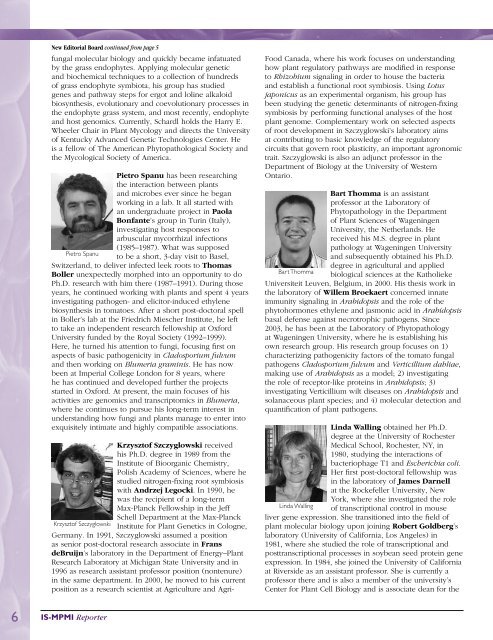IS-MPMI Reporter - International Society for Molecular Plant-Microbe ...
IS-MPMI Reporter - International Society for Molecular Plant-Microbe ...
IS-MPMI Reporter - International Society for Molecular Plant-Microbe ...
You also want an ePaper? Increase the reach of your titles
YUMPU automatically turns print PDFs into web optimized ePapers that Google loves.
New Editorial Board continued from page 5<br />
fungal molecular biology and quickly became infatuated<br />
by the grass endophytes. Applying molecular genetic<br />
and biochemical techniques to a collection of hundreds<br />
of grass endophyte symbiota, his group has studied<br />
genes and pathway steps <strong>for</strong> ergot and loline alkaloid<br />
biosynthesis, evolutionary and coevolutionary processes in<br />
the endophyte grass system, and most recently, endophyte<br />
and host genomics. Currently, Schardl holds the Harry E.<br />
Wheeler Chair in <strong>Plant</strong> Mycology and directs the University<br />
of Kentucky Advanced Genetic Technologies Center. He<br />
is a fellow of The American Phytopathological <strong>Society</strong> and<br />
the Mycological <strong>Society</strong> of America.<br />
Pietro Spanu has been researching<br />
the interaction between plants<br />
and microbes ever since he began<br />
working in a lab. It all started with<br />
an undergraduate project in Paola<br />
Bonfante’s group in Turin (Italy),<br />
investigating host responses to<br />
arbuscular mycorrhizal infections<br />
(1985–1987). What was supposed<br />
Pietro Spanu to be a short, 3-day visit to Basel,<br />
Switzerland, to deliver infected leek roots to Thomas<br />
Boller unexpectedly morphed into an opportunity to do<br />
Ph.D. research with him there (1987–1991). During those<br />
years, he continued working with plants and spent 4 years<br />
investigating pathogen- and elicitor-induced ethylene<br />
biosynthesis in tomatoes. After a short post-doctoral spell<br />
in Boller’s lab at the Friedrich Miescher Institute, he left<br />
to take an independent research fellowship at Ox<strong>for</strong>d<br />
University funded by the Royal <strong>Society</strong> (1992–1999).<br />
Here, he turned his attention to fungi, focusing first on<br />
aspects of basic pathogenicity in Cladosporium fulvum<br />
and then working on Blumeria graminis. He has now<br />
been at Imperial College London <strong>for</strong> 8 years, where<br />
he has continued and developed further the projects<br />
started in Ox<strong>for</strong>d. At present, the main focuses of his<br />
activities are genomics and transcriptomics in Blumeria,<br />
where he continues to pursue his long-term interest in<br />
understanding how fungi and plants manage to enter into<br />
exquisitely intimate and highly compatible associations.<br />
Krzysztof Szczyglowski received<br />
his Ph.D. degree in 1989 from the<br />
Institute of Bioorganic Chemistry,<br />
Polish Academy of Sciences, where he<br />
studied nitrogen-fixing root symbiosis<br />
with Andrzej Legocki. In 1990, he<br />
was the recipient of a long-term<br />
Max-Planck Fellowship in the Jeff<br />
Schell Department at the Max-Planck<br />
Krzysztof Szczyglowski Institute <strong>for</strong> <strong>Plant</strong> Genetics in Cologne,<br />
Germany. In 1991, Szczyglowski assumed a position<br />
as senior post-doctoral research associate in Frans<br />
deBruijn’s laboratory in the Department of Energy–<strong>Plant</strong><br />
Research Laboratory at Michigan State University and in<br />
1996 as research assistant professor position (nontenure)<br />
in the same department. In 2000, he moved to his current<br />
position as a research scientist at Agriculture and Agri-<br />
<strong>IS</strong>-<strong>MPMI</strong> <strong>Reporter</strong><br />
Food Canada, where his work focuses on understanding<br />
how plant regulatory pathways are modified in response<br />
to Rhizobium signaling in order to house the bacteria<br />
and establish a functional root symbiosis. Using Lotus<br />
japonicus as an experimental organism, his group has<br />
been studying the genetic determinants of nitrogen-fixing<br />
symbiosis by per<strong>for</strong>ming functional analyses of the host<br />
plant genome. Complementary work on selected aspects<br />
of root development in Szczyglowski’s laboratory aims<br />
at contributing to basic knowledge of the regulatory<br />
circuits that govern root plasticity, an important agronomic<br />
trait. Szczyglowski is also an adjunct professor in the<br />
Department of Biology at the University of Western<br />
Ontario.<br />
Bart Thomma is an assistant<br />
professor at the Laboratory of<br />
Phytopathology in the Department<br />
of <strong>Plant</strong> Sciences of Wageningen<br />
University, the Netherlands. He<br />
received his M.S. degree in plant<br />
pathology at Wageningen University<br />
and subsequently obtained his Ph.D.<br />
degree in agricultural and applied<br />
Bart Thomma biological sciences at the Katholieke<br />
Universiteit Leuven, Belgium, in 2000. His thesis work in<br />
the laboratory of Willem Broekaert concerned innate<br />
immunity signaling in Arabidopsis and the role of the<br />
phytohormones ethylene and jasmonic acid in Arabidopsis<br />
basal defense against necrotrophic pathogens. Since<br />
2003, he has been at the Laboratory of Phytopathology<br />
at Wageningen University, where he is establishing his<br />
own research group. His research group focuses on 1)<br />
characterizing pathogenicity factors of the tomato fungal<br />
pathogens Cladosporium fulvum and Verticillium dahliae,<br />
making use of Arabidopsis as a model; 2) investigating<br />
the role of receptor-like proteins in Arabidopsis; 3)<br />
investigating Verticillium wilt diseases on Arabidopsis and<br />
solanaceous plant species; and 4) molecular detection and<br />
quantification of plant pathogens.<br />
Linda Walling obtained her Ph.D.<br />
degree at the University of Rochester<br />
Medical School, Rochester, NY, in<br />
1980, studying the interactions of<br />
bacteriophage T1 and Escherichia coli.<br />
Her first post-doctoral fellowship was<br />
in the laboratory of James Darnell<br />
at the Rockefeller University, New<br />
York, where she investigated the role<br />
Linda Walling of transcriptional control in mouse<br />
liver gene expression. She transitioned into the field of<br />
plant molecular biology upon joining Robert Goldberg’s<br />
laboratory (University of Cali<strong>for</strong>nia, Los Angeles) in<br />
1981, where she studied the role of transcriptional and<br />
posttranscriptional processes in soybean seed protein gene<br />
expression. In 1984, she joined the University of Cali<strong>for</strong>nia<br />
at Riverside as an assistant professor. She is currently a<br />
professor there and is also a member of the university’s<br />
Center <strong>for</strong> <strong>Plant</strong> Cell Biology and is associate dean <strong>for</strong> the


